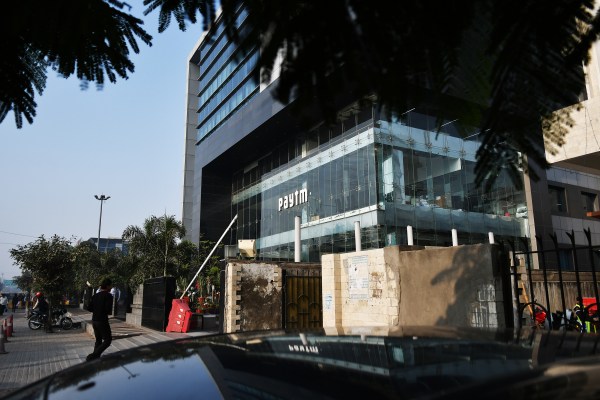Paytm said Thursday that it will cease work with its associate Paytm Payments Bank and accelerate plans to partner with other banks, after India’s central bank barred Paytm Payments Bank from conducting nearly all of its business activities due to supervisory concerns.
The Noida-based financial services firm said it expects its loan distribution, insurance distribution and equity broking operations to be unaffected by the Reserve Bank of India’s (RBI’s) directive, as those businesses have no relation to Paytm Payments Bank. The payment bank houses 330 million wallet accounts and 30 million bank accounts.
Shares of Paytm fell 20% within minutes of market opening on Thursday, hitting the circuit breaker.
The RBI issued stringent new restrictions on Wednesday on Paytm Payments Bank, which processes transactions for Paytm, effectively ending the bank’s operations by barring it from providing many banking services, including accepting fresh deposits and enabling credit transactions. It also asked Paytm and Paytm Payments Bank to terminate their nodal accounts. Paytm said it will move its nodal to other banks.
“The Paytm Payment Gateway business (online merchants) will continue to offer payment solutions to its existing merchants. OCL’s [Paytm’s] offline merchant payment network offerings like Paytm QR, Paytm Soundbox, Paytm Card Machine, will continue as usual, where it can onboard new offline merchants as well,” Paytm said in a stock exchange filing.
Paytm said it expects $36 million to $60 million to be wiped from its annual EBITDA going forward in a “worst-case scenario.” It said the next phase is to continue expanding payments and financial services, “only in partnerships with other banks.”
Some analysts and other industry executives cautioned that Paytm’s path to convincing banks to work with it might not be so easy. “In the event lenders were to get more cautious in their partnerships with Paytm post RBI action on PPBL, coupled with the recently announced scale-back of small ticket loans, we estimate 40-45% negative revenue impact on Paytm, with implied value per share of Rs450, or 41% downside from the current share price,” Goldman Sachs analysts wrote in a note Thursday.
One97 Communications, the parent firm of Paytm, owns a 49% stake in Payment Payments Bank whereas rest equity is owned by Paytm founder Vijay Shekhar Sharma. A payments bank license allows the holder to offer a number of banking services, though some restrictions are in place. The RBI gave final approval of payments bank to Paytm in early 2017.
Wednesday’s clampdown follows the RBI ordering Paytm Payments Bank to stop taking on new customers in 2022, a curb it still maintains. The RBI said an audit found “persistent” noncompliance and “continued material supervisory concerns,” warranting further action.
“We have seen RBI take ~15 months time to revoke its ban on digital business activities of the largest private sector bank. However, in this case since the first ban (in March 2022) for onboarding new customers (~22 months have lapsed), RBI has conducted a comprehensive IT audit and continued to identify non-compliance, which in our view indicates that these lapses are quite material,” Macquarie analysts wrote in a note.
“Accordingly, we do not see any near term solution to these problems and this effectively means, in our view, that RBI is indirectly revoking the PPI (pre-paid instrument) licence of Paytm.”
Goldman Sachs analysts added: “Our key concern, unlike previous directives, is that the RBI has not, so far, made any comments around potential steps towards a resolution, suggesting to us that the directive could stay in place for the foreseeable future.”
Jefferies said in a note Thursday that RBI’s order can have a direct impact of 20-30% on Ebitda and the “reputational impact on lending partnerships can affect further by 20-25%. This drives us to cut FY25-26 Ebitda by 45% that will also delay profitability.”
